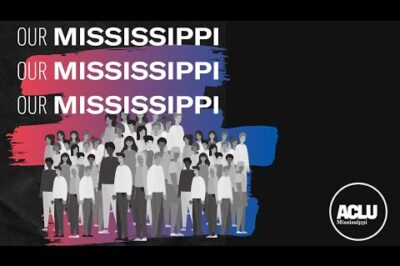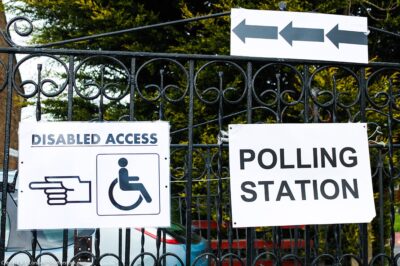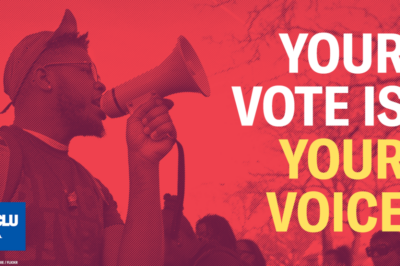Expected Judgment in Florida Voting Rights Lawsuit Will Restore Civil and Voting Rights to Thousands of Ex-Felons
FOR IMMEDIATE RELEASE
MIAMI – Saying that as many as 30,000 ex-felons are likely to regain their voting and civil rights within the next year, the American Civil Liberties Union of Florida today released a proposed final judgment in a lawsuit against the Florida Department of Corrections that mandates assistance to ex-felons who did not receive help in the application process from the state, as required by law.
“”As a result of this lawsuit, thousands of ex-felons in Florida are well on their way to regaining their rights, having a voice in their local communities, and being able to qualify for work, pay their taxes and support their families,”” said Howard Simon, Executive Director of the ACLU of Florida.
The final judgment, which is likely to be approved by Leon County Circuit Court Judge P. Kevin Davey, comes in the lawsuit, Florida Conference of Black State Legislators et al. v. James Crosby, No. 01-659, filed by the ACLU of Florida, the Florida Justice Institute and Florida Legal Services on behalf of black state lawmakers, three Miami-based organizations that work with ex-felons and several individuals with past felony convictions.
The ACLU contended in its lawsuit that the state had failed to comply with its statutory obligation to assist offenders-prior to their release from supervision-with the application process to restore voting and civil rights.
During the course of the lawsuit, the ACLU said, the Department of Corrections acknowledged that 124,769 offenders who were released between 1992 and 2001 did not receive assistance pursuant to Florida law, which requires that the department assist inmates who are about to be released from custody or supervision with the application for restoration of civil rights.
In August 2002, Judge Davey directed the parties in the lawsuit to submit a plan to assist the former felons with the application process. The expected judgment instructs the department to assist the Office of Executive Clemency in screening all those ex-felons and processing the rights of those who qualify for rights restoration without a hearing before the Board of Executive Clemency. The Department also has agreed to assist the Office of Executive Clemency in mailing ex-felons notices informing them that their rights have been restored.
Florida’s voting and civil rights ban affects more than 500,000 people who have lost the right to vote and hold some state occupational licenses. Disenfranchisement is a lifetime ban, unless rights are restored by the Board of Executive Clemency.
Because up to 83 percent of the nearly 125,000 ex-felons who were identified by the state do not qualify for rights restoration without a hearing, the department also agreed to assist the Office of Executive Clemency in mailing the necessary application forms to request a hearing for the restoration of rights. The process of applying for restoration of civil rights with a hearing often takes several years, the ACLU noted – and even then, there is no guarantee that applicants will have their rights restored.
“”Whatever good results that came from this case are only a drop in the bucket,”” said Randy Berg, an attorney with Florida Legal Services and lead counsel in this lawsuit. “”Many of these people should have had their rights restored nine years ago, which is further evidence that this entire process needs to be changed. The Governor and the Cabinet can change this process this afternoon with a vote of the Clemency Board and the stroke of the Governor’s pen.””
Courtenay Strickland, Director of the ACLU’s Rights Restoration Project, added: “The State of Florida is creating varying degrees of citizenship by singling out people with felony convictions. When our government starts creating degrees of citizenship, we’re creating something that’s not quite a democracy.”
The screening process to determine who is eligible for restoration without a hearing could take up to 12 months.
In the meantime, the state will send letters to people who do not qualify for civil rights restoration without a hearing and place public service announcements on local media outlets to announce a new toll-free number and web site for people to call to inquire about the process.
Florida is one of only six states that impose a lifetime civil and voting rights ban upon a felony conviction. According to the lawsuit, loss of civil rights takes away not only the right to vote, but also the right to hold public office, serve on a jury and qualify for certain types of state occupational licenses necessary for many jobs.
The case was filed in Leon County Circuit Court in Tallahassee in 2001on behalf of: Florida Conference of Black State Legislators, People United to Lead the Struggle For Equality (PULSE), Brothers of the Same Mind, Inner City Grass Roots Civic Coalition, and these individual plaintiffs with past felony convictions: Reginald Greenlee, Joseph Brown, Milton McCloud and Hollis Horton.
In addition to Berg, JoNel Newman and Charles F. Elsesser of Florida Legal Services and Randall Marshall, Legal Director of the ACLU of Florida are all serving as attorneys in this case.
The original complaint is available online at: http://www.aclufl.org/ex-felons__voting_rights.html.
More information on this issue is available online at: http://www.aclufl.org/felonydisenfranchisement.html.
Stay Informed
Every month, you'll receive regular roundups of the most important civil rights and civil liberties developments. Remember: a well-informed citizenry is the best defense against tyranny.




